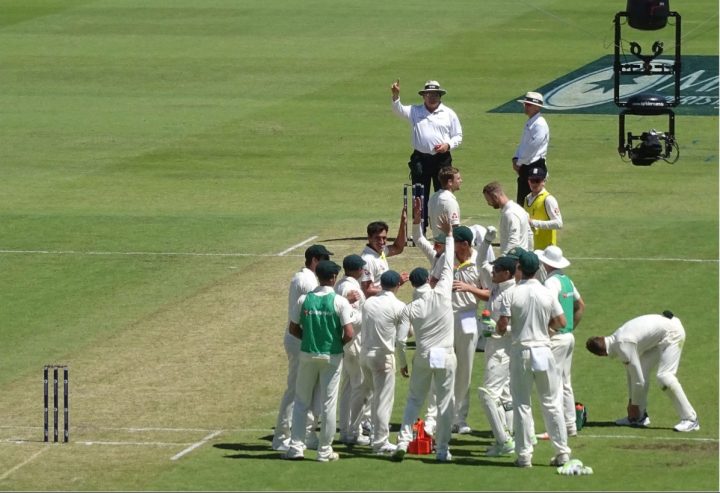It was Tregaskis who kicked it all off.
It hardly serves journalistic detachment if cricket correspondents are out playing golf with England team members. Caesar's wife & all that!
— Tregaskis (@Tregaskis1) October 29, 2015
Then came the replies.
@Tregaskis1 @the_topspin What codswallop. It's our job to find out stuff and anyway who has accused us of an overly-cosy relationship?
— John Etheridge (@JohnSunCricket) October 29, 2015
I couldn’t resist adding my three penn’orth.
@Tregaskis1 @JohnSunCricket @the_topspin It doesn't happen outside sport, though, does it? Pol corrs don't play golf with cabinet ministers
— Maxie Allen (@MaxieAllen) October 30, 2015
To which came the responses (one of which was surprisingly testy):
@the_topspin @MaxieAllen @Tregaskis1 There's MPs v media football match. You're talking nonsense. Suggest stick to something you know about
— John Etheridge (@JohnSunCricket) October 30, 2015
I defended with a very straight bat:
@MaxieAllen @JohnSunCricket @Tregaskis1 You keep citing principles, and we'll keep doing our jobs and trying to get to know contacts better
— Lawrence Booth (@the_topspin) October 30, 2015
It’s a shame that both Lawrence and John appear to have taken it slightly personally, as I have never criticised either of them, on any platform, even when the latter swallowed-whole a complete load of bollocks about Kevin Pietersen’s hundredth-cap present (a still-unexplained mystery). Neither have I suggested that either allows their personal copy to be influenced by unduly close relationships with players or management.
But it does happen, and to suggest otherwise is naive. The incestuousness of cricket’s inner circle muddies the waters to such a murky degree that we, the poor old audience, struggle to tell where the press ends and the team begins.
Love to my dear friends David and Lisa Saker, and family, returning to Melbourne today. Go well with Vics and Renegades mate.
— mike selvey (@selvecricket) May 26, 2015
Is anyone seriously going to suggest that such a close friendship between a broadsheet cricket correspondent, and a (then) senior member of the England management, would never colour what ended up being written in any way which wasn’t fully transparent?
And is it just coincidence that the Daily Mail’s Paul Newman is, in copy, so relentlessly supportive and admiring of Alastair Cook – and then we read this and this.
The miasma of toxic cosiness emanates much more strongly, though, from the broadcast commentary boxes than Fleet Street. Alastair Cook once referred to Sky Sports’ Nasser Hussain as “one of my best friends”. On TMS, Graeme Swann openly refers to his close friendships with Cook, Stuart Broad, and James Anderson.
Bias not does have to be intentional or overt to be bias. I’m sure that both Hussain and Swann approach their commentary work with conscientiousness and the best of intentions. But they’re only human. Are they – is anyone? – truly capable of analysing their friends’ work with total detachment and objectivity, at all times? And can they express views which have not been influenced by unreferred-to off-record conversations?
It was reported today that Shane Warne and Alastair Cook have buried the hatchet, a further development since their telephone conversation last year, when they “sorted things out”, following Warne’s on-air criticism of Cook.
What requirement was there either to bury a hatchet or sort things out? Why was this rapprochement brought about? Cook is captain; Warne commentates on him. Why do they need to be on good terms? Do you ever read about Jeremy Paxman ringing up David Cameron so they can be buddies again?
Mainstream cricket journalists set great store by access to, and contacts with, England players – and these factors were at the heart of the argument put forward by Lawrence Booth and John Etheridge. It’s OK to get matey with the squad, so the logic goes, because the relationships generate good material.
But this philosophy too often leads them up a blind alley while simultaneously jarring with the appetities of the cricket media’s audience.
Where does access to players lead you? Almost always, to dull-as-ditchwater interviews with cricketers who are too young, too boring, too scared, and too PR-managed, to utter a single interesting comment.
What’s that you have? An interview with Ben Stokes, at a corporate event for Investec? Wow, that really will be an amazing read.
It was suggested on Twitter that I should stick to subjects I know about. Well here’s one. I’ve spent my entire life around fellow cricket-lovers – family, colleagues, friends, team-mates, online debaters, and bloggers. And I’ve watched my cricket from the same viewpoint as everyone else – on TV, or from the stands. So I know something about what cricket fans appreciate when it comes to media coverage of the game.
They/we enjoy (a) the action itself, (b) pithy, honest analysis and (c) truth. Like any audience, cricket watchers respect, and demand, truth. In terms of cricket punditry, this translates into a genuine, heartfelt opinion, based on evidence and experience which is made explicitly clear – as opposed to prejudice or innuendo. And when it comes to cricket news, it translates into the exposure of the real facts – which are not always the same as unattributed briefings, or off-the-record conversations, passed off as fact.
Ultimately, though, the real point is not whether cricket journalists are misinfluenced by their relationships with players and management, but the perception that they might be. Hence our return, as Tregaskis pointed out, to Caesar’s wife.
This is the point which Lawrence and John appear to miss – as does virtually every other member of the mainstream cricket media. Even if some recognise that readers will draw conclusions from their conduct about their independence and partialiy, all but a few feel it’s beneath them to do anything about it. On a broad level, this reflects the press’s general arrogance and sense of entitlement, a belief that their position alone confers unquestioned authority and demands unconditional respect. The idea that a discerning reader or viewer might not obediently lap up their every word, but instead question their authority, impartiality, and judgement, is anathema.
Cricket is a multi-billion dollar sport, run by politicians, and awash with skulduggery. It demands ruthless, serious journalism from inquiring and tenacious minds – not lazy, pub-chat, matiness, Ironically, John and Lawrence are two of the most intelligent and broad-minded operators on the circuit, both possessed with the acuity to understand where people like TFT and Dmitri come from, what motivates us, and and why we bang the drums we do.
So I hope they and their ilk can come to appreciate why “doing their jobs” involves maintaining a perception of independence and detachment. Cricket has to play by the same rules as every other branch of journalism. Despite what they say, Laura Kuenssberg simply doesn’t go on golfing jollies with George Osborne. And only in cricket would you see a photo like this.
Maxie Allen.









